全新版大学英语快速阅读第二册课文
Cheetahsinfocus全新版大学英语试听阅读2中英双语概括
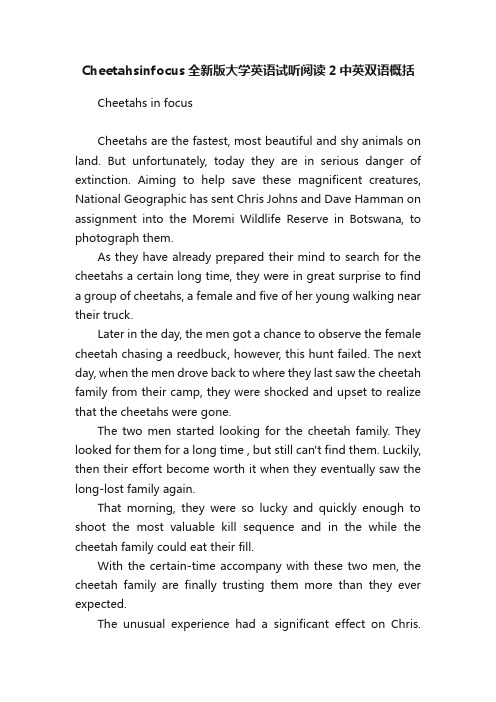
Cheetahsinfocus全新版大学英语试听阅读2中英双语概括Cheetahs in focusCheetahs are the fastest, most beautiful and shy animals on land. But unfortunately, today they are in serious danger of extinction. Aiming to help save these magnificent creatures, National Geographic has sent Chris Johns and Dave Hamman on assignment into the Moremi Wildlife Reserve in Botswana, to photograph them.As they have already prepared their mind to search for the cheetahs a certain long time, they were in great surprise to find a group of cheetahs, a female and five of her young walking near their truck.Later in the day, the men got a chance to observe the female cheetah chasing a reedbuck, however, this hunt failed. The next day, when the men drove back to where they last saw the cheetah family from their camp, they were shocked and upset to realize that the cheetahs were gone.The two men started looking for the cheetah family. They looked for them for a long time , but still can't find them. Luckily, then their effort become worth it when they eventually saw the long-lost family again.That morning, they were so lucky and quickly enough to shoot the most valuable kill sequence and in the while the cheetah family could eat their fill.With the certain-time accompany with these two men, the cheetah family are finally trusting them more than they ever expected.The unusual experience had a significant effect on Chris.Hopefully, he can fulfill his responsibility of bringing the endanger animals into world focus and maybe his action will work.猎豹焦点猎豹是陆地上最快,最美丽,最害羞的动物。
全新版大学英语第二版第二册Unit2课文译文及参考答案
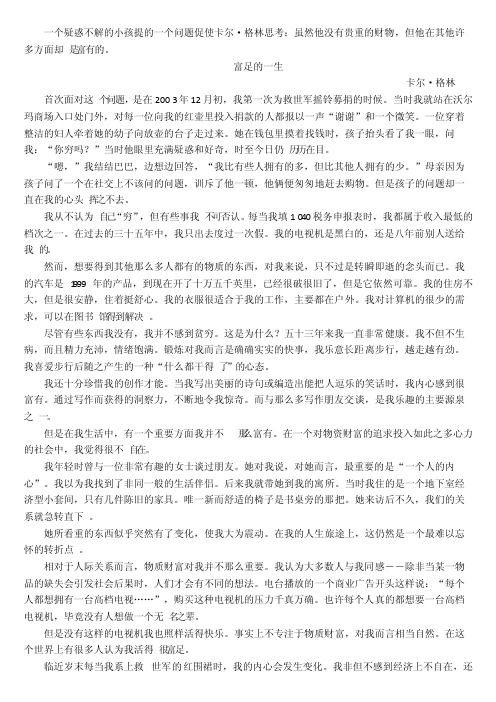
一个疑惑不解的小孩提的一个问题促使卡尔·格林思考:虽然他没有贵重的财物,但他在其他许多方面却是富有的。
富足的一生卡尔·格林首次面对这个问题,是在2003年12月初,我第一次为救世军摇铃募捐的时候。
当时我就站在沃尔玛商场入口处门外,对每一位向我的红壶里投入捐款的人都报以一声“谢谢”和一个微笑。
一位穿着整洁的妇人牵着她的幼子向放壶的台子走过来。
她在钱包里摸着找钱时,孩子抬头看了我一眼,问我:“你穷吗?”当时他眼里充满疑惑和好奇,时至今日仍历历在目。
“嗯,”我结结巴巴,边想边回答,“我比有些人拥有的多,但比其他人拥有的少。
”母亲因为孩子问了一个在社交上不该问的问题,训斥了他一顿,他俩便匆匆地赶去购物。
但是孩子的问题却一直在我的心头挥之不去。
我从不认为自己“穷”,但有些事我不可否认。
每当我填1040税务申报表时,我都属于收入最低的档次之一。
在过去的三十五年中,我只出去度过一次假。
我的电视机是黑白的,还是八年前别人送给我的。
然而,想要得到其他那么多人都有的物质的东西,对我来说,只不过是转瞬即逝的念头而已。
我的汽车是1999年的产品,到现在开了十万五千英里,已经很破很旧了,但是它依然可靠。
我的住房不大,但是很安静,住着挺舒心。
我的衣服很适合于我的工作,主要都在户外。
我对计算机的很少的需求,可以在图书馆得到解决。
尽管有些东西我没有,我并不感到贫穷。
这是为什么?五十三年来我一直非常健康。
我不但不生病,而且精力充沛,情绪饱满。
锻炼对我而言是确确实实的快事,我乐意长距离步行,越走越有劲。
我喜爱步行后随之产生的一种“什么都干得了”的心态。
我还十分珍惜我的创作才能。
当我写出美丽的诗句或编造出能把人逗乐的笑话时,我内心感到很富有。
全新版大学英语(第二版)快速阅读3翻译

一Alone in the Arctic Cold 一个人在北极严寒一天打碎了非常寒冷和灰色,当那个人偏离主要育空试验和爬上斜坡,在那里的是一个朦胧而过去向东穿过了踪迹松林之间。
坡率陡峭,而且他停顿了一下喘不过气来保持最佳的状态。
没有太阳和缕阳光,尽管他天空无云。
这是一个晴朗的日子,但在那里似乎是一个蒙上了一层水汽表面看来,把这天黑暗。
这个事实不担心那个人。
他被用来缺乏阳光。
那人回头而且他已经来了。
育空河打下英里宽藏起来了以下3英尺的冰。
这个世界上的冰一样多英尺的积雪。
这是连续的白色的,除了一个黑暗的发际线了痕迹,向南延伸达500英里去的库特关口。
但是,整个神秘,深远的发际线跟踪,没有太阳从天空,巨大的冷的,陌生和怪异的没有什么印象all-made上了的人。
他是新来的人在这地,这是他的第一个冬天。
他的问题他是缺乏想象力。
他很快和警惕在生活的一切,但只有在去吧,而不是在意义。
意思eighty-odd零下五十度学位霜。
这样的事实了冷漠,而且不舒服,就这些。
它并不带他去思考男人的一般是脆弱,能够只活在确定的限度窄的热量和冷。
零下五度代表点冰霜伤害必须提防,利用厚,暖和的衣服。
50度以下零是他就精确50度零度以下。
应该有其他东西了可那是一个思想,从来没有进过他的头上。
当他转身要走,他吐不确定。
就有一个陡坡、易爆裂纹他的震惊。
他吐了。
又一次,空气里之前,这可能下降至雪吐口唾沫裂了。
他知道五十岁的唾沫在雪地上闪现下面,但这吐口唾沫空气中闪现了。
毫无疑问这个五十个更加寒冷below-how要冷得多了不知道。
但是温度还显得无关紧要。
他注定的老我的左边叉子汉德森的孩子们在小溪了。
他们来了在山上从印度人小河的国家,虽然他来拐弯抹角看一看的可能性走出木材来源于群岛的育空。
他要在六营地点,有点天黑之后,这是真的,但男孩们会去,火灾的去,和热晚饭将为此做好准备。
他陷入水中在大松树。
踪迹减弱了。
他很高兴他没有雪橇、旅游的光。
全新版大学英语快速阅读3(第二版)(新题型版)中文翻译(最新整理)

他们是最好的朋友。 迈阿密大学,2000年5月:先生瓦尔德斯是踢足球,因为他做的每星期六与一群浅肤色的拉丁 美洲人在一个附近的公园里。他的公寓。他先生儒兹的惊喜,游览先生的普拉德霍贝架设到了冲 洗和出汗,跑去迎接他。他们握手时热烈。 但当先生的普拉德霍贝架设到了回到比赛飞镖,儒兹先生去一边站,双臂交叉,看他儿时的朋 友玩游戏曾是他们共同的欢乐。帮儒兹先生不再踢足球。他喜欢篮球与黑色的拉丁裔和非裔美国 人从他的邻居。 这两个人生活只有四英里远的地方,即使是15分钟的车程。他们还被更大的距离,他们说,他 们从来没有想过回到古巴。 显示的方式是黑人,但明显少得多,那件白色的,他们已经分开成长在美国由于种族。第一次, 他们居住在一个地方,他们的皮肤颜色的轮廓lives-where定义他们生活的朋友,他们怎么说,她 们穿什么,连他们吃。
和机遇的确很少。夫人公园在一次采访中说:回到那时,我们没有任何公民权利。这只是一种 生存,现有的从带到下一天。我还记得去睡眠作为一个女孩听到这个Klan在夜间开车听见私刑和 害怕这个房子会烧掉。
在相同的采访中,她说她感到恐惧时,因为她一直面对恐惧。这个无畏给她勇气去战胜她确信 她在巴士抵制运动。“我没有什么特别的恐惧,”她说。“这是更多的救济知道我并不孤单。”
(完整版)全新版大学英语2第二单元ALifeFullofRiches

A Life Full of Riches富足的一生It was early December 2003, my first season as a Salvation Army bell ringer, when I was confronted with the question. I was standing just outside the doorway of a Wal-Mart, offering a "thank you" and a smile to each person who dropped a donation into my red kettle. A neatly dressed woman and her young son walked up to the kettle stand. While she searched her purse for some cash, the boy looked up at me. I can still see the confusion and curiosity in his eyes as he asked, "Are you poor?"首次面对这个问题,是在2003年12月初,我第一次为救世军摇铃募捐的时候。
当时我就站在沃尔玛商场入口处门外,对每一位向我的红壶里投入捐款的人都报以一声“谢谢”和一个微笑。
一位穿着整洁的妇人牵着她的幼子向放壶的台子走过来。
她在钱包里摸着找钱时,孩子抬头看了我一眼,问我:“你穷吗?”当时他眼里充满疑惑和好奇,时至今日仍历历在目。
"Well," I stammered, trying to think, "I have more than some people, but not as much as others." His mother scolded him for the social no-no, and they hurried off to do their shopping. His question, however, did not leave me.“嗯,”我结结巴巴,边想边回答,“我比有些人拥有的多,但比其他人拥有的少。
全新版大学英语 第二版 阅读教程
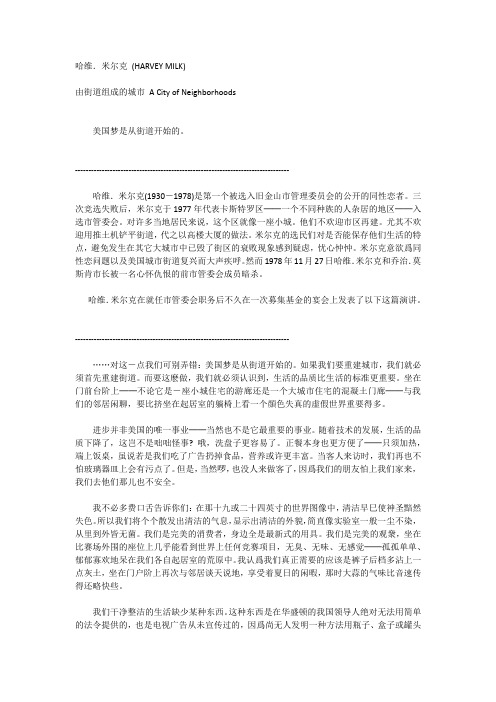
哈维.米尔克(HARVEY MILK)由街道组成的城市A City of Neighborhoods美国梦是从街道开始的。
--------------------------------------------------------------------------------哈维.米尔克(1930-1978)是第一个被选入旧金山市管理委员会的公开的同性恋者。
三次竞选失败后,米尔克于1977年代表卡斯特罗区──一个不同种族的人杂居的地区──入选市管委会。
对许多当地居民来说,这个区就像一座小城。
他们不欢迎市区再建。
尤其不欢迎用推土机铲平街道,代之以高楼大厦的做法。
米尔克的选民们对是否能保存他们生活的特点,避免发生在其它大城市中已毁了街区的衰败现象感到疑虑,忧心忡忡。
米尔克意欲爲同性恋问题以及美国城市街道复兴而大声疾呼。
然而1978年11月27日哈维.米尔克和乔治.莫斯肯市长被一名心怀仇恨的前市管委会成员暗杀。
哈维.米尔克在就任市管委会职务后不久在一次募集基金的宴会上发表了以下这篇演讲。
--------------------------------------------------------------------------------……对这-点我们可别弄错:美国梦是从街道开始的。
如果我们要重建城市,我们就必须首先重建街道。
而要这麽做,我们就必须认识到,生活的品质比生活的标准更重要。
坐在门前台阶上──不论它是-座小城住宅的游廊还是一个大城市住宅的混凝土门廊──与我们的邻居闲聊,要比挤坐在起居室的躺椅上看一个顔色失真的虚假世界重要得多。
进步并非美国的唯一事业──当然也不是它最重要的事业。
随着技术的发展,生活的品质下降了,这岂不是咄咄怪事? 哦,洗盘子更容易了。
正餐本身也更方便了──只须加热,端上饭桌,虽说若是我们吃了广告扔掉食品,营养或许更丰富。
当客人来访时,我们再也不怕玻璃器皿上会有污点了。
全新版大学英语第二册1~4单元课文背诵及翻译

全新版大学英语第二册1~4单元课文背诵及翻译12 One way of summarizing the American position is to state that we value originality and independence more than the Chinese do. The contrast between our two cultures can also be seen in terms of the fears we both harbor. Chinese teachers are fearful that if skills are not acquired early, they may never be acquired; there is, on the other hand, no comparable hurry to promote creativity. American educators fear that unless creativity has been acquired early, it may never emerge; on the other hand, skills can be picked up later.13 However, I do not want to overstate my case. There is enormous creativity to be found in Chinese scientific, technological and artistic innovations past and present. And there is a danger of exaggerating creative breakthroughs in the West. When any innovation is examined closely, its reliance on previous achievements is all too apparent (the “standing on the shoulders of giants” phenomenon).14 But assuming that the contrast I have developed is valid, and that the fostering of skills and creativity are both worthwhile goals, the important question becomes this: Can we gather, from the Chinese and American extremes, a superior way to approach education, perhaps striking a better balance between the poles of creativity and basic skills?Unit 219 Walton set up a college scholarship fund for employees?children, a disaster relief fund to rebuild employee homes damaged by fires, floods, tornadoes, and the like. He believed in cultivating ideas and rewarding success.20 “He?d say, …That fell ow worked hard, let?s give him alittle extra,?”recalls retired president Ferold F. Arend, who was stunned at such generosity after the stingy employer he left to join Wal-Mart. “I had to change my way of thinking when I came aboard.”21 “The reason for our success,” says Walton, in a company handout, “is our people and the way they?re treated and the way they feel about their company. They believe things are different here, but they deserve the credit.”22 Adds company lawyer Jim Hendren: “I?ve never seen anyone yet who worked for him or was around him for any length of time who wasn?t better off. And I don?t mean just financially, although a lot of people are. It?s just something about him—coming into contact with Sam Walton just makes you a better person.”12 美国人的立场可以概括起来这么说,我们比中国人更重视创造和自立。
新标准大学英语第二册(第二版)全册课文
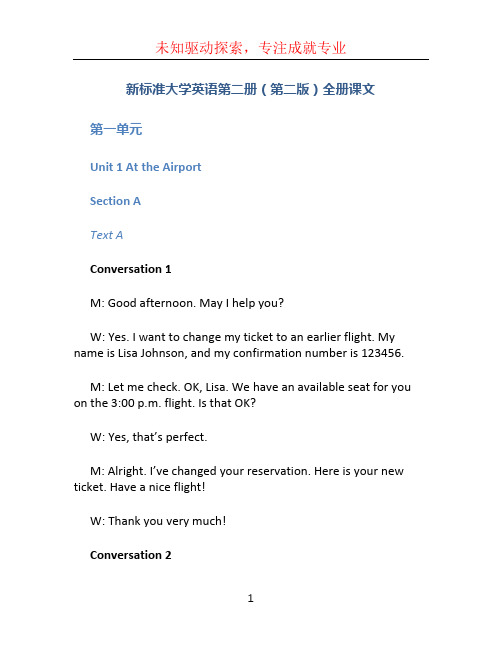
新标准大学英语第二册(第二版)全册课文第一单元Unit 1 At the AirportSection AText AConversation 1M: Good afternoon. May I help you?W: Yes. I want to change my ticket to an earlier flight. My name is Lisa Johnson, and my confirmation number is 123456.M: Let me check. OK, Lisa. We have an available seat for you on the 3:00 p.m. flight. Is that OK?W: Yes, that’s perfect.M: Alright. I’ve changed your reservation. Here is your new ticket. Have a nice flight!W: Thank you very much!Conversation 2M: Hi, I’ve got some extra t ime before my flight. Do you know if there’s a restaurant around here?W: Yes, there are a few restaurants in the airport. If you go to the second floor, there’s a food court with different options.M: Thanks! I’ll go check it out.W: You’re welcome!Text BConversation 1M: Excuse me. Is this seat taken?W: Oh, no. You can take it.M: Thanks. Can I use the pillow and the blanket?W: Sure. Help yourself. They are free for use during the flight.M: Great!Conversation 2M: Excuse me, is there a restroom on the plane?W: Yes, there’s one at the back of the airplane.M: How long does the flight take?W: The flight takes about four hours, including a stopover in Chicago.M: Oh, I see. Thank you!Section BText AListening 1Narrator: Welcome to the English Language Study Program at our university. Today, we are going to talk about the courses you will take during your studies. As you know, we have different levels—elementary, intermediate, and advanced. The courses you take will depend on your language ability. If you are an elementary student, you will begin with basic grammar and vocabulary classes. In these classes, you will learn simple sentence structures and common words. You will also practice listening and speaking skills through conversations and group activities. In the intermediate level, you will build on what you learned in the elementary level. You will study more complex grammar and expand your vocabulary. You will also read short stories and articles to improve your reading comprehension. In the advanced level, you will focus on advanced grammar, such as conditional sentences and reported speech. You will also read authentic materials like newspapers and academic texts. You will have the opportunity to express your opinions and ideas through debates and presentations. We hope you enjoy your studies here!Listening 2Narrator: Welcome to our university’s library. Here you will find a wide range of resources for your studies. Let me introduce you to the different sections in our library. We have a fiction section where you can find popular novels and literature. If you are interested in history or biographies, you can check out our non-fiction section. We also have a reference section with dictionaries, encyclopedias, and other reference books. In addition, we have a periodical section where you can find newspapers and magazines. If you are looking for computer resources or e-books, we have a digital section as well. Finally, we have a quiet study area where you can study in peace. Please be reminded to keep your noise level down and respect other students’ study time. Enjoy your time in the library!Text BListening 1Narrator: Welcome to the English Language Study Program at our university. Today, we are going to talk about the courses you will take during your studies. As you know, we have different levels—elementary, intermediate, and advanced. In the elementary level, you will start with learning basic greetings, introducing yourself, and asking simple questions. You will also learn about daily routines, family members, and describing people and places. In the intermediate level, you will continue to build on what you learned in the elementary level. You will study more complex grammar, such as past tenses and conditionals. You will also learn how to express your opinions and arguments in spoken and written English. In the advanced level, you will focus on academic skills, such as writing essays, giving presentations, and participating in discussions. You will also work on your listeningand reading skills through various authentic materials. We wish you success in your language studies!Listening 2Narrator: Welcome to our university library. Here you will find a wide range of resources to support your studies. Let me take you on a tour of our library. On the ground floor, we have the circulation desk where you can borrow and return books. We also have a self-checkout machine, which allows you to check out books by yourself. On the first floor, you will find the reference desk where our librarians are available to assist you with your research. This floor also houses our quiet study area, where you can concentrate on your studies without distractions. The second floor is home to the computer lab and the multimedia center, where you can access online databases and multimedia materials. Finally, on the third floor, we have group study rooms that can be booked in advance for group projects or study sessions. We hope you make good use of our library resources and have a productive academic experience!第二单元Unit 2 Taking a TaxiSection AText AConversation 1M: Excuse me, is this seat taken?W: No, it’s not. You can have it.M: Thank you.W: You’re welcome.Conversation 2M: Pardon me, do you know how much longer it will take to get to the airport?W: I think it should be about another 10 minutes. The traffic is quite heavy today.M: OK, thanks for letting me know.Text BConversation 1M: Excuse me, is this your bag?W: No, it’s not mine. Maybe it belongs to the passenger who sat here before me.M: Oh, I see. I’ll ask the flight attendant to take care of it.Conversation 2M: Do you mind if we lower the window a little? It’s too hot here.W: No, I don’t mind. Feel free to adjust the temperature to your comfort.Section BText AListening 1Narrator: Welcome to the English Language Study Program at our university. Today, we are going to talk about the courses you will take during your studies. In the elementary level, you will learn the basics of English, including greetings, introductions, and daily routines. You will also learn about different countries, cultures, and customs. In the intermediate level, you will build on what you learned in the elementary level. You will study more complex grammar topics, such as verb tenses, conditionals, and reported speech. You will also practice your reading and writing skills through various texts and assignments. In the advanced level, you will focus on academic English and critical thinking skills. You will learn how to write research papers, give presentations, and participate in discussions. You will also study advanced grammar structures and expand your vocabulary. We hope you enjoy your language studies!Listening 2Narrator: Welcome to our university library. We have a wide collection of books and resources to support your studies. On theground floor, you will find our fiction and non-fiction sections. The fiction section has a variety of novels, short stories, and poetry collections. The non-fiction section includes books on various subjects, such as history, science, and philosophy. On the first floor, we have our reference section, where you can find dictionaries, encyclopedias, and other reference materials. We also have a periodical section, which houses newspapers, magazines, and journals. The second floor is home to our digital section, where you can access e-books, online databases, and multimedia materials. Finally, we have a quiet study area on the third floor, where you can study in a peaceful environment. We hope you make the most of our library resources and have a successful academic journey!Text BListening 1Narrator: Welcome to the English Language Study Program at our university. Today, we are going to talk about the courses you will take during your studies. In the elementary level, you will learn the basics of English, such as greetings, introducing yourself, and asking and answering questions. You will also learn about different topics, including family, hobbies, and daily routines. In the intermediate level, you will continue to build on what you learned in the elementary level. You will study more complex grammar, such as different verb tenses and conditionals. You will also practice your listening and speaking skills through various activities and conversations. In the advanced level, you will focus on academic English and critical thinking skills. You will learn how to write essays, give presentations, and participate in discussions. You will also study advanced grammar and vocabulary to improveyour language proficiency. We wish you success in your language studies!Listening 2Narrator: Welcome to our university library. We have a wide range of resources to support your academic journey. On the ground floor, you will find our fiction section, where you can discover popular novels, classic literature, and poetry collections. The non-fiction section, also located on this floor, has books on various subjects, such as history, science, and philosophy. On the first floor, we have our reference section, which includes dictionaries, encyclopedias, and other reference materials. The periodical section is also on this floor, where you can find newspapers, magazines, and academic journals. In addition, we have a digital section on the second floor, where you can access e-books, online databases, and multimedia resources. Finally, we have a quiet study area on the third floor, where you can focus on your studies without distractions. We hope you find our library resources helpful and have a rewarding academic experience!(1208 words)。
全新版大学英语第二版第二册Unit2课文译文及参考答案
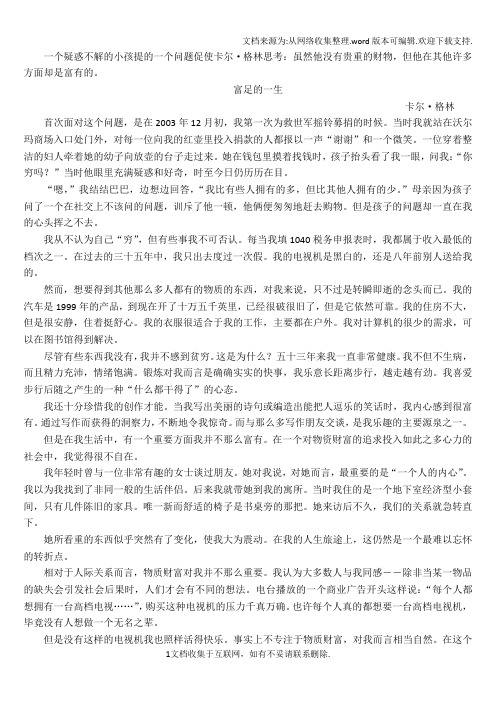
一个疑惑不解的小孩提的一个问题促使卡尔·格林思考:虽然他没有贵重的财物,但他在其他许多方面却是富有的。
富足的一生卡尔·格林首次面对这个问题,是在2003年12月初,我第一次为救世军摇铃募捐的时候。
当时我就站在沃尔玛商场入口处门外,对每一位向我的红壶里投入捐款的人都报以一声“谢谢”和一个微笑。
一位穿着整洁的妇人牵着她的幼子向放壶的台子走过来。
她在钱包里摸着找钱时,孩子抬头看了我一眼,问我:“你穷吗?”当时他眼里充满疑惑和好奇,时至今日仍历历在目。
“嗯,”我结结巴巴,边想边回答,“我比有些人拥有的多,但比其他人拥有的少。
”母亲因为孩子问了一个在社交上不该问的问题,训斥了他一顿,他俩便匆匆地赶去购物。
但是孩子的问题却一直在我的心头挥之不去。
我从不认为自己“穷”,但有些事我不可否认。
每当我填1040税务申报表时,我都属于收入最低的档次之一。
在过去的三十五年中,我只出去度过一次假。
我的电视机是黑白的,还是八年前别人送给我的。
然而,想要得到其他那么多人都有的物质的东西,对我来说,只不过是转瞬即逝的念头而已。
我的汽车是1999年的产品,到现在开了十万五千英里,已经很破很旧了,但是它依然可靠。
我的住房不大,但是很安静,住着挺舒心。
我的衣服很适合于我的工作,主要都在户外。
我对计算机的很少的需求,可以在图书馆得到解决。
尽管有些东西我没有,我并不感到贫穷。
这是为什么?五十三年来我一直非常健康。
我不但不生病,而且精力充沛,情绪饱满。
锻炼对我而言是确确实实的快事,我乐意长距离步行,越走越有劲。
我喜爱步行后随之产生的一种“什么都干得了”的心态。
我还十分珍惜我的创作才能。
当我写出美丽的诗句或编造出能把人逗乐的笑话时,我内心感到很富有。
通过写作而获得的洞察力,不断地令我惊奇。
而与那么多写作朋友交谈,是我乐趣的主要源泉之一。
但是在我生活中,有一个重要方面我并不那么富有。
在一个对物资财富的追求投入如此之多心力的社会中,我觉得很不自在。
全新版大学英语阅读教程2(第二版)2翻译及原文
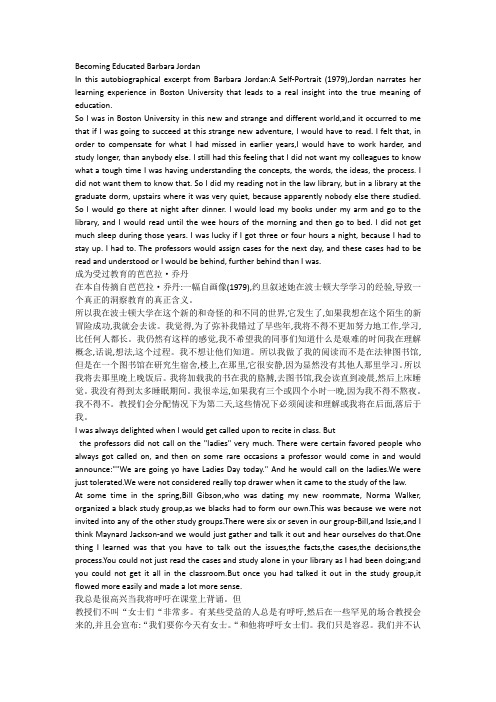
Becoming Educated Barbara JordanIn this autobiographical excerpt from Barbara Jordan:A Self-Portrait (1979),Jordan narrates her learning experience in Boston University that leads to a real insight into the true meaning of education.So I was in Boston University in this new and strange and different world,and it occurred to me that if I was going to succeed at this strange new adventure, I would have to read. I felt that, in order to compensate for what I had missed in earlier years,I would have to work harder, and study longer, than anybody else. I still had this feeling that I did not want my colleagues to know what a tough time I was having understanding the concepts, the words, the ideas, the process. I did not want them to know that. So I did my reading not in the law library, but in a library at the graduate dorm, upstairs where it was very quiet, because apparently nobody else there studied. So I would go there at night after dinner. I would load my books under my arm and go to the library, and I would read until the wee hours of the morning and then go to bed. I did not get much sleep during those years. I was lucky if I got three or four hours a night, because I had to stay up. I had to. The professors would assign cases for the next day, and these cases had to be read and understood or I would be behind, further behind than I was.成为受过教育的芭芭拉·乔丹在本自传摘自芭芭拉·乔丹:一幅自画像(1979),约旦叙述她在波士顿大学学习的经验,导致一个真正的洞察教育的真正含义。
全新版大学英语第二版阅读教程2 课文翻译
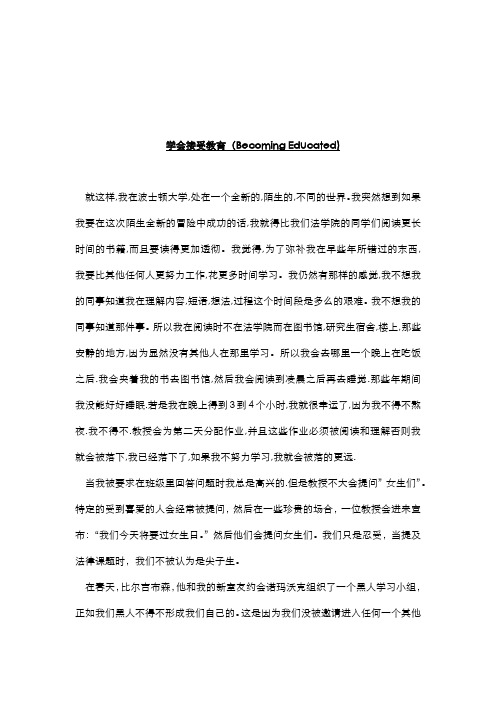
学会接受教育(Becoming Educated)就这样,我在波士顿大学,处在一个全新的,陌生的,不同的世界。
我突然想到如果我要在这次陌生全新的冒险中成功的话,我就得比我们法学院的同学们阅读更长时间的书籍,而且要读得更加透彻。
我觉得,为了弥补我在早些年所错过的东西,我要比其他任何人更努力工作,花更多时间学习。
我仍然有那样的感觉,我不想我的同事知道我在理解内容,短语,想法,过程这个时间段是多么的艰难。
我不想我的同事知道那件事。
所以我在阅读时不在法学院而在图书馆,研究生宿舍,楼上,那些安静的地方,因为显然没有其他人在那里学习。
所以我会去哪里一个晚上在吃饭之后.我会夹着我的书去图书馆,然后我会阅读到凌晨之后再去睡觉.那些年期间我没能好好睡眠.若是我在晚上得到3到4个小时,我就很幸运了,因为我不得不熬夜.我不得不.教授会为第二天分配作业,并且这些作业必须被阅读和理解否则我就会被落下,我已经落下了,如果我不努力学习,我就会被落的更远.当我被要求在班级里回答问题时我总是高兴的.但是教授不大会提问”女生们”。
特定的受到喜爱的人会经常被提问,然后在一些珍贵的场合,一位教授会进来宣布:“我们今天将要过女生日。
”然后他们会提问女生们。
我们只是忍受,当提及法律课题时,我们不被认为是尖子生。
在春天,比尔吉布森,他和我的新室友约会诺玛沃克组织了一个黑人学习小组,正如我们黑人不得不形成我们自己的。
这是因为我们没被邀请进入任何一个其他的学习小组。
我们组有6/7个成员,比尔和萨还有梅纳德杰克逊收集交流和听取我们怎么做。
我学到的一件事是,我们必须讲出来,问题,事实,案例还是过程。
我们不能仅仅阅读案例,独自在图书馆里学习,正如我以前一直那样,呆在教室里学不到全部。
但一旦我们在学习小组中讲出来了,接下来就变得更简单更容易理解了。
我不时会去罗利街2号看看路易斯是怎么做的。
她总是在看《红书》。
在那里我每次想要和她讨论某件事的时候,她会同时在阅读《红书》上的一则简短的故事。
全新版大学英语快速阅读2课后练习题含答案
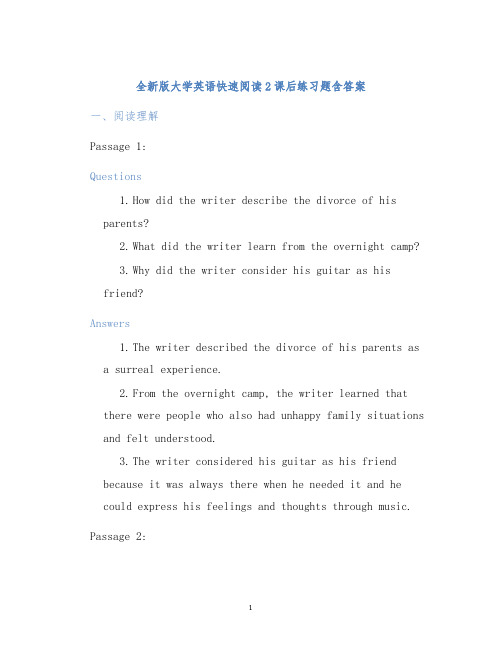
全新版大学英语快速阅读2课后练习题含答案一、阅读理解Passage 1:Questions1.How did the writer describe the divorce of hisparents?2.What did the writer learn from the overnight camp?3.Why did the writer consider his guitar as hisfriend?Answers1.The writer described the divorce of his parents asa surreal experience.2.From the overnight camp, the writer learned thatthere were people who also had unhappy family situations and felt understood.3.The writer considered his guitar as his friendbecause it was always there when he needed it and hecould express his feelings and thoughts through music. Passage 2:Questions1.What is the mn concern of this passage?2.What can the walking meditation offer to thepractitioners?3.Why should we pay attention to our surroundingsduring the walking meditation?Answers1.The mn concern of this passage is the practice ofwalking meditation.2.The walking meditation can offer peace, relaxation,and self-awareness to the practitioners.3.We should pay attention to our surroundings duringthe walking meditation to stay present and mindful, andto appreciate the beauty and wonder of nature.二、词汇运用Questions1.Choose the correct word to complete the sentence:Maria is always ___________ about her health, she exercises regularly and eats a balanced diet.a)passionateb)truthfulc)conscientiousd)understandable2.Choose the word with the opposite meaning to theone in capitals:The film was very entertning but it also had some____________ parts.a)humorousb)dullc)fascinatingd)delightful3.Choose the best option to complete the sentence:I __________ studied French for two years, but I still can’t speak it fluently.a)haveb)have beenc)hadd)had beenAnswersc)conscientiousb)dulla)have三、完形填空Years before most Americans had heard of COVID-19,Dr. Lorna Breen was 1 to do something to help others dealwith the stress and demands of medicine. Her concern aboutthe high suicide rate among medical professionals, combined with her own struggle with depression, 2 her to make this her life mission. 3 she was working as an emergency room doctorat a New York City hospital, where she had been pushed to the 4 of exhaustion by the COVID-19 pandemic. She 5 the virus herself and had to take a leave of absence to recover. Eventually, she returned to work, only to 6 that theemotional burden had become unbearable. She broke down crying, had to be hospitalized and left the hospital’s employ to 7to Charlottesville, Virginia, where she had grown up. There,in April, she took her own life.Questions1.Which phrase can replace “bound and determined”in the first sentence?2.What two factors led Dr. Lorna Breen to makemedicine her life mission?3.What happened to Dr. Lorna Breen during thepandemic?4.What happened to Dr. Lorna Breen in April?5.Which word can replace “unbearable” in the sixthsentence?Answers1.Determined and committed.2.Her concern about the high suicide rate amongmedical professionals and her own struggle withdepression.3.She contracted the virus herself and had to take aleave of absence to recover.4.She took her own life.5.Intolerable.。
全新版大学英语快速阅读第二册课文
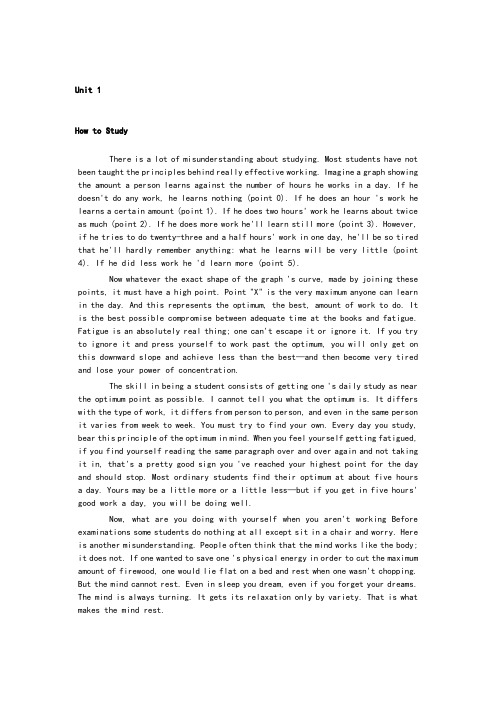
Unit 1How to StudyThere is a lot of misunderstanding about studying. Most students have not been taught the principles behind really effective working. Imagine a graph showing the amount a person learns against the number of hours he works in a day. If he doesn't do any work, he learns nothing (point 0). If he does an hour 's work he learns a certain amount (point 1). If he does two hours' work he learns about twice as much (point 2). If he does more work he'll learn still more (point 3). However, if he tries to do twenty-three and a half hours' work in one day, he'll be so tired that he'll hardly remember anything: what he learns will be very little (point 4). If he did less work he 'd learn more (point 5).Now whatever the exact shape of the graph 's curve, made by joining these points, it must have a high point. Point "X" is the very maximum anyone can learn in the day. And this represents the optimum, the best, amount of work to do. It is the best possible compromise between adequate time at the books and fatigue. Fatigue is an absolutely real thing; one can't escape it or ignore it. If you try to ignore it and press yourself to work past the optimum, you will only get on this downward slope and achieve less than the best—and then become very tired and lose your power of concentration.The skill in being a student consists of getting one 's daily study as near the optimum point as possible. I cannot tell you what the optimum is. It differs with the type of work, it differs from person to person, and even in the same person it varies from week to week. You must try to find your own. Every day you study, bear this principle of the optimum in mind. When you feel yourself getting fatigued, if you find yourself reading the same paragraph over and over again and not taking it in, that's a pretty good sign you 've reached your highest point for the day and should stop. Most ordinary students find their optimum at about five hours a day. Yours may be a little more or a little less—but if you get in five hours' good work a day, you will be doing well.Now, what are you doing with yourself when you aren't working Before examinations some students do nothing at all except sit in a chair and worry. Here is another misunderstanding. People often think that the mind works like the body; it does not. If one wanted to save one 's physical energy in order to cut the maximum amount of firewood, one would lie flat on a bed and rest when one wasn't chopping. But the mind cannot rest. Even in sleep you dream, even if you forget your dreams. The mind is always turning. It gets its relaxation only by variety. That is what makes the mind rest.When you 've finished your optimum number of hours you must stop. You must not then sit around in the chair thinking about the work—that only tires without any learning. You must get out and do something. It doesn't matter what—anything so long as you are actively doing something else but work.有一个关于学习有许多误解。
(完整word版)全新版大学英语快速阅读2第一单元翻译
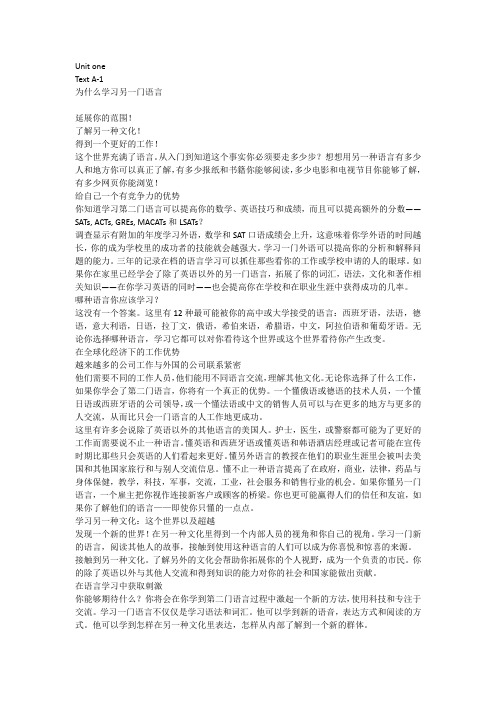
1、频繁的进行英语实验。首先阅读的英语课本,然后听和看一起,然后只听不看。说出或写下你刚刚听到的。
2、在班里当其他同学说的时候静静的听。注意这个作业,不要担心你会做。
3、如果你感到紧张,通过休息一下和深呼吸来放松自己的身体。当你被叫到时,暂停,放松,给自己一个准备的反应。
4、练习:参加语言俱乐部,看外国电视,听外语收音。
最有效的学习是你的积极而不是消极。一个消极的过程(就像看电视)得到的很少甚至在你的部分里没有功能,信息也会很快忘记。在积极学习时,你的关注度会达到最高,使你完全理解整个话题。高效学习让你在学习过程中成为一个积极的参与者。
这里有许多方法和技巧可以让你成长为一个积极学习的人。下面是一些建议。
通过浏览课本的章节预习课程材料来了解主题和思想。问自己一些问题,然后在你阅读的时候做笔记(用自己的话)。这将意味着你在讲师讨论之前抓住了文章的主要材料。
阅读技巧
1、首先,为完成任务而阅读词汇清单。然后关于文章带着问题去读。然后看整篇文章两到三遍,通过上下文猜测文章的含义。避免逐词的翻译。这是浪费时间。
2、把新词汇分离出来单独学习。不要在写在行之间!做一个新的单词卡然后记住它。带着他们然后在每天的零碎的时间背诵。学习他们直到你能自动记住。
3、分离新的语法然后单独学习。写下和标记例句。当你阅读到面对这个模式时,暂停下然后背诵这个模板来认出来。
Unitone
Text A-1
为什么学习另一门语言
延展你的范围!
了解另一种文化!
得到一个更好的工作!
这个世界充满了语言。从入门到知道这个事实你必须要走多少步?想想用另一种语言有多少人和地方你可以真正了解,有多少了解,有多少网页你能浏览!
给自己一个有竞争力的优势
全新版大学英语第二册课文
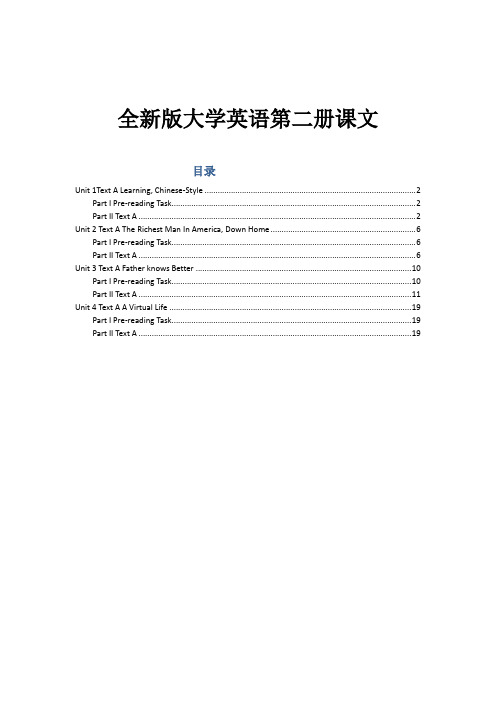
全新版大学英语第二册课文目录Unit 1Text A Learning, Chinese-Style (2)Part I Pre-reading Task (2)Part II Text A (2)Unit 2 Text A The Richest Man In America, Down Home (6)Part I Pre-reading Task (6)Part II Text A (6)Unit 3 Text A Father knows Better (10)Part I Pre-reading Task (10)Part II Text A (11)Unit 4 Text A A Virtual Life (19)Part I Pre-reading Task (19)Part II Text A (19)Unit 1Text A Learning, Chinese-StyleText 课文Part I Pre-reading TaskListen to the recording two or three times and then think over the following questions:1. Who should teach whom? Is learning a one-way street?2. Should we share our dreams for a better life with our parents or keep them to ourselves?3. Can children ever understand their parents completely?4. From the song can you guess what the theme of the unit, way of learning, chiefly refers to? Part II Text AHoward Gardner, a professor of education at Harvard University, reflects on a visit to China and gives his thoughts on different approaches to learning in China and the West.LEARNING, CHINESE-STYLEHoward GardnerFor a month in the spring of 1987, my wife Ellen and I lived in the bustling eastern Chinese city of Nanjing with our 18-month-old son Benjamin while studying arts education in Chinese kindergartens and elementary schools. But one of the most telling lessons Ellen and I got in the difference between Chinese and American ideas of education came not in the classroom but in the lobby of the Jinling Hotel where we stayed in Nanjing.The key to our room was attached to a large plastic block with the room number on it. When leaving the hotel, a guest was encouraged to turn in the key, either by handing it to an attendant or by dropping it through a slot into a box. Because the key slot was narrow, the key had to be positioned carefully to fit into it.Benjamin loved to carry the key around, shaking it vigorously. He also liked to try to place it into the slot. Because of his tender age and incomplete understanding of the need to position the key just so, he would usually fail. Benjamin was not bothered in the least. He probably got asmuch pleasure out of the sounds the key made as he did those few times when the key actually found its way into the slot.Now both Ellen and I were perfectly happy to allow Benjamin to bang the key near the key slot. His exploratory behavior seemed harmless enough. But I soon observed an interesting phenomenon. Any Chinese staff member nearby would come over to watch Benjamin and, noting his lack of initial success, attempt to assist. He or she would hold onto Benjamin's hand and, gently but firmly, guide it directly toward the slot, reposition it as necessary, and help him to insert it. The "teacher" would then smile somewhat expectantly at Ellen or me, as if awaiting a thank you —and on occasion would frown slightly, as if considering us to be neglecting our parental duties.I soon realized that this incident was directly relevant to our assigned tasks in China: to investigate the ways of early childhood education (especially in the arts), and to throw light on Chinese attitudes toward creativity. And so before long I began to introduce the key-slot anecdote into my discussions with Chinese educators.TWO DIFFERENT WAYS TO LEARNWith a few exceptions my Chinese colleagues displayed the same attitude as the staff at the Jinling Hotel. Since adults know how to place the key in the key slot, which is the ultimate purpose of approaching the slot, and since the child is neither old enough nor clever enough to realize the desired action on his own, what possible gain is achieved by having him struggle? He may well get frustrated and angry — certainly not a desirable outcome. Why not show him what to do? He will be happy, he will learn how to accomplish the task sooner, and then he can proceed to more complex activities, like opening the door or asking for the key— both of which accomplishments can (and should) in due course be modeled for him as well.We listened to such explanations sympathetically and explained that, first of all, we did not much care whether Benjamin succeeded in inserting the key into the slot. He was having a good time and was exploring, two activities that did matter to us. But the critical point was that, in the process, we were trying to teach Benjamin that one can solve a problem effectively by oneself. Such self-reliance is a principal value of child rearing in middle-class America. So long as the child is shown exactly how to do something — whether it be placing a key in a key slot, drawing a hen or making up for a misdeed — he is less likely to figure out himself how to accomplish such a task. And, more generally, he is less likely to view life — as Americans do — as a series of situations in which one has to learn to think for oneself, to solve problems on one's own and even to discover new problems for which creative solutions are wanted.TEACHING BY HOLDING HIS HANDIn retrospect, it became clear to me that this incident was indeed key — and key in more than one sense. It pointed to important differences in the educational and artistic practices in our two countries.When our well-intentioned Chinese observers came to Benjamin's rescue, they did not simply push his hand down clumsily or uncertainly, as I might have done. Instead, they guided him with extreme facility and gentleness in precisely the desired direction. I came to realize that these Chinese were not just molding and shaping Benjamin's performance in any old manner: In the best Chinese tradition, they were ba zhe shoujiao —"teaching by holding his hand" —so much so that he would happily come back for more.The idea that learning should take place by continual careful shaping and molding applies equally to the arts. Watching children at work in a classroom setting, we were astonished by their facility. Children as young as 5 or 6 were painting flowers, fish and animals with the skill and confidence of an adult; calligraphers 9 and 10 years old were producing works that could have been displayed in a museum. In a visit to the homes of two of the young artists, we learned from their parents that they worked on perfecting their craft for several hours a day.CREATIVITY FIRST?In terms of attitudes to creativity there seems to be a reversal of priorities: young Westerners making their boldest departures first and then gradually mastering the tradition; and young Chinese being almost inseparable from the tradition, but, over time, possibly evolving to a point equally original.One way of summarizing the American position is to state that we value originality and independence more than the Chinese do. The contrast between our two cultures can also be seen in terms of the fears we both harbor. Chinese teachers are fearful that if skills are not acquired early, they may never be acquired; there is, on the other hand, no comparable hurry to promote creativity. American educators fear that unless creativity has been acquired early, it may never emerge; on the other hand, skills can be picked up later.However, I do not want to overstate my case. There is enormous creativity to be found in Chinese scientific, technological and artistic innovations past and present. And there is a danger of exaggerating creative breakthroughs in the West. When any innovation is examined closely, its reliance on previous achievements is all too apparent (the "standing on the shoulders of giants" phenomenon ).But assuming that the contrast I have developed is valid, and that the fostering of skills and creativity are both worthwhile goals, the important question becomes this: Can we gather, from the Chinese and American extremes, a superior way to approach education, perhaps striking a better balance between the poles of creativity and basic skills?(1182 words)Unit 2 Text A The Richest Man In America, Down HomeText 课文Part I Pre-reading TaskListen to the recording two or three times and then think over the following questions:1. Who is it about?2. What happened to him one day?3. Do you think it was worthwhile to walk two or three miles to pay back the six and a quarter cents?4. Is the story related to the theme of the unit — values?The following words in the recording may be new to you:dismayn. 沮丧,失望disturbvt. 使不安conscientiousa. 认真的,尽职的Part II Text ADoes being rich mean you live a completely different life from ordinary people? Not, it seems, ifyour name is Sam Walton.THE RICHEST MAN IN AMERICA, DOWN HOMEArt HarrisHe put on a dinner jacket to serve as a waiter at the birthday party of The Richest Man in America. He imagined what surely awaited: a mansion, a "Rolls-Royce for every day of the week," dogs with diamond collars, servants everywhere.Then he was off to the house, wheeling past the sleepy town square in Bentonville, a remote Arkansas town of 9,920, where Sam Walton started with a little dime store that grew into a $6 billion discount chain called Wal-Mart. He drove down a country road, turned at a mailbox marked "Sam and Helen Walton," and jumped out at a house in the woods.It was nice, but no palace. The furniture appeared a little worn. An old pickup truck sat in the garage and a muddy bird dog ran about the yard. He never spotted any servants."It was a real disappointment," sighs waiter Jamie Beaulieu.Only in America can a billionaire carry on like plain folks and get away with it. And the 67-year-old discount king Sam Moore Walton still travels these windy back roads in his 1979 Ford pickup, red and white, bird dogs by his side, and, come shooting season, waits in line like everyone else to buy shells at the local Wal-Mart."He doesn't want any special treatment," says night manager Johnny Baker, who struggles to call the boss by his first name as a recent corporate memo commands. Few here think of his billions; they call him "Mr. Sam" and accept his folksy ways. "He's the same man who opened his dime store on the square and worked 18 hours a day for his dream," says Mayor Richard Hoback.By all accounts, he's friendly, cheerful, a fine neighbor who does his best to blend in, never flashy, never throwing his weight around.No matter how big a time he had on Saturday night, you can find him in church on Sunday. Surely in a reserved seat, right? "We don't have reserved seats," says Gordon Garlington III, pastor of the local church.So where does The Richest Man in America sit? Wherever he finds a seat. "Look, he's just not that way. He doesn't have a set place. At a church supper the other night, he and his wife were in back washing dishes."For 19 years, he's used the same barber. John Mayhall finds him waiting when he opens up at 7 a.m. He chats about the national news, or reads in his chair, perhaps the Benton County Daily Democrat, another Walton property that keeps him off the front page. It buried the Forbes list atthe bottom of page 2."He's just not a front-page person," a newspaper employee explains.But one recent morning, The Richest Man in America did something that would have made headlines any where in the world: He forgot his money. "I said, 'Forget it, take care of it next time,'" says barber Mayhall. "But he said, 'No, I'll get it,' and he went home for his wallet."Wasn't that, well, a little strange? "No sir," says Mayhall, "the only thing strange about Sam Walton is that he isn't strange."But just how long Walton can hold firm to his folksy habits with celebrity hunters keeping following him wherever he goes is anyone's guess. Ever since Forbes magazine pronounced him America's richest man, with $2.8 billion in Wal-Mart stock, he's been a rich man on the run, steering clear of reporters, dreamers, and schemers."He may be the richest by Forbes rankings," says corporate affairs director Jim Von Gremp, "but he doesn't know whether he is or not — and he doesn't care. He doesn't spend much. He owns stock, but he's always left it in the company so it could grow. But the real story in his mind is the success achieved by the 100,000 people who make up the Wal-Mart team."He's usually back home for Friday sales meetings, or the executive pep rally Saturday morning at 7 a.m., when Walton, as he does at new store openings, is liable to jump up on a chair and lead everyone in the Wal-Mart cheer: "Give me a W! Give me an A! Give me an L! Louder!"And louder they yell. No one admits to feeling the least bit silly. It's all part of the Wal-Mart way of life as laid down by Sam: loyalty, hard work, long hours; get ideas into the system from the bottom up, Japanese-style; treat your people right; cut prices and margins to the bone and sleep well at night. Employees with one year on board qualify for stock options, and are urged to buy all they can.After the pep rally, there's bird hunting, or tennis on his backyard court. But his stores are always on his mind. One tennis guest managed to put him off his game by asking why a can of balls cost more in one Wal-Mart than another. It turned out to be untrue, but the move worked. Walton lost four straight games.Walton set up a college scholarship fund for employees' children, a disaster relief fund to rebuild employee homes damaged by fires, floods, tornadoes, and the like. He believed in cultivating ideas and rewarding success."He'd say, 'That fellow worked hard, let's give him a little extra,'" recalls retired president Ferold F. Arend, who was stunned at such generosity after the stingy employer he left to join Wal-Mart. "I had to change my way of thinking when I came aboard.""The reason for our success," says Walton, in a company handout, "is our people and the way they're treated and the way they feel about their company. They believe things are different here, but they deserve the credit."Adds company lawyer Jim Hendren: "I've never seen anyone yet who worked for him or was around him for any length of time who wasn't better off. And I don't mean just financially, although a lot of people are. It's just something about him —coming into contact with Sam Walton just makes you a better person." (1066 words)Unit 3 Text A Father knows BetterText 课文Part I Pre-reading TaskListen to the recording two or three times and then think over the following questions:1. What sort of a song is it?2. Who should be sitting up and taking notice? Why?3. What does the singer think of his parent's way of doing things?4. Do you agree with what he says?The following words in the recording may be new to you:roamvi. 漫游drenchvt. 使湿透prophesizev. 作预言senatorn. 参议员heedvt. 注意stallv. 拖延ragevi. 激烈地进行Part II Text AThis comedy centers around a proud father's attempts to help his children, attempts which somehow or other always end up embarrassing them. For the sake of fun it carries things to extremes, but nearly everyone can recognize something of themselves and their parents in it.FATHER KNOWS BETTERMarsh CassadyCHARACTERS: FATHER; MOTHER; HEIDI, 14; DIANE, 17; SEAN, 16; RESTAURANT MANAGER, 20s; MRS. HIGGINS.SETTING: Various locations including a fast-food restaurant, the Thompson family dining room, and an office at a high school.ATRISE: As the lights come up, HEIDI enters and crosses Down Right to the edge of the stage. SEAN and DIANE enter and cross Down Left to the edge of the stage. They listen as HEIDI addresses the audience.HEIDI: My dad's a nice man. Nobody could possibly believe that he isn't. Yet he's... well, he's always doing these stupid things that end up really embarrassing one or more of us kids. One time, see, my brother wanted to buy this guitar. Been saving money for it for a long time. Then he got a job at this fast-food place, OK? Waiting tables. It was Sean's first actual job, and he was real happy about it. He figured in two or three months he'd have enough money to buy exactly the kind of guitar he wanted. Mom and Dad were proud of him, and well, OK, he's my big brother, and he's always pulling these dumb things on me. But, well, I was proud of him too. You know what happened? I hate to tell you because:SEAN, DIANE and HEIDI: (In unison) Father knows better!(The lights come Up Left on the fast-food restaurant where SEAN works. It consists of acounter and a couple of small tables. The MAN-AGER stands behind the counter. SEAN is busily cleaning the tables when FATHER walks in.)MANAGER: Good evening, sir. May I help you?FATHER: Good evening.SEAN: (To himself) Oh, no!(He squats behind one of the tables trying to hide from FATHER.)FATHER: I'm looking for the manager.MANAGER: That would be me, sir.FATHER: I'm Sam Thompson. My son works here.MANAGER: Oh, you're Sean's father.FATHER: Yes. It's his first job, you know. I just wanted to check that he's doing OK.MANAGER: Oh, fine. No problem.SEAN: (Spreading his hands, palms up, speaking to himself) What did I do to deserve this? Tell me what?FATHER: Hiring him was a good thing then?MANAGER: Well, yeah, I suppose so.SEAN: (Still to himself.) Go home, Dad. Go home. Go home.FATHER: I'm sure he's a good worker but a typical teenager, if you know what I mean.MANAGER: (Losing interest) I wouldn't know.FATHER: He's a good boy. And I assure you that if there are any subjects that need to be addressed, Sean and I will have a man-to-man talk.MANAGER: I don't think that will be necessary...FATHER: Oh, no problem. I'm proud of my son. Very, very proud. And I just wanted you to know that I'll do anything I can to help him through life's dangerous sea.SEAN: (Standing up and screaming) Aaaargh! Aaaargh! Aaaaaaargh!FATHER: Son, I didn't know you were here.SEAN: It's where I work, Dad.FATHER: Of course. I mean, I didn't see you.SEAN: I can't imagine why.FATHER: Your manager and I were just having a nice chat.(DIANE enters Down Left just as HEIDI enters Down Right. They look at SEAN and FATHER.)SEAN, DIANE, HEIDI: (In unison) Father, you know better than that.(The lights quickly fade to black and then come up a second or two later. SEAN stands alone at the Down Right edge of the stage. HEIDI and DIANE cross to Down Left edge of the stage.)SEAN: If that sort of thing happened only once in a while, it wouldn't be so bad. Overall, I wouldn't want to trade my dad for anyone else's. He loves us kids and Mom too. But I think that's sometimes the problem. He wants to do things for us, things he thinks are good. But he needs to give them more thought because:SEAN, HEIDI and DIANE: (In unison) Father knows better!(The lights fade to black and come up on the Center Stage area where FATHER and the three children are seated around the dining room table. MOTHER enters carrying a dish, which she sets on the table. FATHER quickly rises and pulls out her chair. She sits. The family starts eating dinner.)FATHER: I have a surprise for you, Diane.DIANE: (Knows it can't be good.) You have... a surprise?MOTHER: Well, whatever it is, dear, don't keep us in suspense.FATHER: Well, you know, Dan Lucas and I work together?DIANE: Kyle's father?MOTHER: Don't interrupt, dear, your father is trying to tell you something.HEIDI: (Stage whisper to SEAN) Something Diane won't want to know, I'll bet.SEAN: (Whispering to HEIDI) Whatever would make you think that?MOTHER: Sean, dear. Heidi, sweetheart, don't distract your father.SEAN and HEIDI: (Simultaneously) Sorry, Mom.FATHER: Now then. As I was saying, I know how much you like young Kyle.DIANE: Father!FATHER: It's true, isn't it? Didn't I hear you tell your mother that you wish Kyle would ask you to the senior prom?SEAN: Uh-oh!HEIDI: Oops!MOTHER: Please, children, please. Your father is trying to speak.DIANE: (Through clenched teeth, the words are in a monotone and evenly spaced.) Yes-I-said-that-why-are-you-asking?FATHER: Well then.DIANE: (Becoming hysterical) "Well then" what?!FATHER: What did I say? Did I say something wrong?HEIDI: (To SEAN) Not yet, he didn't.SEAN: (To HEIDI) But you know it's coming.MOTHER: Children, please. Do give your father the respect he deserves.HEIDI and SEAN: (Rolling their eyes) Yes, Mother.FATHER: Well, today I saw Dan and asked if he'd like to go to lunch at that French restaurant on Third Street. You know the one, Mother.MOTHER: Well, yes, I believe I do.FATHER: My treat, I told him. And, of course, he was glad to accept.MOTHER: Why wouldn't he be?FATHER: (Somewhat surprised) Well, yes.DIANE: What-has-this-to-do-with me?!MOTHER: Diane, sometimes I just don't understand your behavior. I try my best.DIANE: (Very short with her) I'm sorry.MOTHER: Thank you, Diane. (To FATHER) Please do go on, dear.FATHER: As I said —HEIDI: We know what you said, Daddy.FATHER: Er... uh, what's that?SEAN: She said, "We know what you said, Daddy."FATHER: Yes, yes, of course.MOTHER: Do get on with it, dear. I've made the most glorious dessert. An old recipe handed down to me by my great Aunt Hilda —DIANE: Mother, please!MOTHER: Yes, dear?(DIANE shakes her head and lets her body fall against the back of the chair.)FATHER: At any rate, Dan's a nice guy. Never knew him well. Found we have a lot of the same interests. Our families, our community, global peace, human welfare.HEIDI: (Mumbling to herself) That narrows it down, all right.SEAN: Father?FATHER: Yes, son?SEAN: I do believe Diane would like to know the surprise.DIANE: (Breathing hard as if exhausted, she turns to SEAN, nodding her head up and down repeatedly.) Thank you, Sean. I owe you one.FATHER: Well, yes. Here it is then. I told Dan of your interest in his son.DIANE: You what?MOTHER: Diane, what has come over you? I just don't understand the younger generation. Why back in my day —DIANE: Mother, please!MOTHER: What, what? What?HEIDI: Mother, I believe she wants Father to continue.SEAN: (To himself) Get this over with, more likely.DIANE: Daddy, please, tell me. Now. Right away. What did you say, Daddy? Please. Tell me, what did you tell Mr. Lucas? Tell me, please. Please, tell me.FATHER: Well, now, isn't this nice. It looks like my little scheme is a success. You're so eager to find out... makes a man feel as if it's all worthwhile.HEIDI: (To SEAN) Can you believe this?SEAN: (To HEIDI) Oh, sure. Can't you?FATHER: Yes, well, I told him how much you liked young Kyle, and how you'd been wishing he'd ask you to the prom.DIANE: You didn't! Tell me you didn't!FATHER: Oh, yes. Anything for my children.DIANE: (Swallowing hard) And... and —MOTHER: Diane, are you all right?DIANE: (She juts out her chin at MOTHER and quickly jerks her head around to face FATHER.) Well... what did he say?!FATHER: Well, of course, being the sort of man he is — frank, understanding, he said he'd speak to the young man, insist he give you a call.DIANE: (Angry scream!) Whaaaaaat!SEAN and HEIDI: (Together) Father, you know better than that.FATHER: I do? Yes, yes, I guess I do. I've... done it again, haven't I?(The lights quickly fade to black and then come up a second or two later. DIANE stands alone at the Down Right edge of the stage. HEIDI and SEAN enter Down Left and cross to the edge of the stage.)DIANE: Can you imagine how humiliated I was? An honor student, class president. And Father was out asking people to have their sons call and ask me to the prom! But that's dear old dad. Actually, he is a dear. He just doesn't stop to think. And it's not just one of us who've felt the heavy hand of interference. Oh, no, all three of us live in constant dread knowing that at any time disaster can strike because:DIANE, HEIDI and SEAN: (Shouting in unison) Father knows better.(The lights fade to black and quickly come up again Stage Left where there is an executive-type desk and chair and two other chairs. Behind the desk sits MRS. HIGGINS, in charge of admitting new students to Benjamin Harrison High School. HEIDI and FATHER sit in the other chairs.)MRS. HIGGINS: So this is our new student, is it?FATHER: That's right.MRS. HIGGINS: What's your name, young lady?HEIDI: HEIDI Thompson.MRS. HIGGINS: I'm sure you'll find the students friendly. And the teachers more than willing to answer questions.FATHER: She is an exceptional young woman, you know.HEIDI: Daddy!FATHER: Very, very bright.MRS. HIGGINS: Yes, now if we can get you to fill out —FATHER: Don't know where she got her brains. Her mother, I suppose. Oh, I was bright enough. But nothing like HEIDI. All her teachers have told Mrs. Thompson — that's her mother — and me that she was just about the brightest —MRS. HIGGINS: (Interrupts as she loses her patience, though trying to be pleasant) As I said, if you have proof of vaccinations —FATHER: (Interrupts, carrying on with his line of thought) Besides being bright, she's very, very talented.HEIDI: (Twists her hands over and over in front of her chest.) Please, Daddy, don't do this.FATHER: Well, of course I will, darling. I'm proud of you. Your mother and I are proud of you. (Turns back to MRS.HIGGINS.) Why just last year, in her last year of junior high school, before we moved, Heidi placed first in the county in the annual spelling bee! Isn't that wonderful? And she plays the piano like an angel. An absolute angel.HEIDI: Daddy, please. Please, please. Daddy, I have to go to class. I want to go to class. Please let me go to class.FATHER: See what I mean? Such an eager learner. I can't imagine anyone's being more eager for knowledge than my Heidi. My little girl.MRS. HIGGINS: Yes, well, be that as it may —HEIDI: Aaargh! Aaaaargh! Aaaargh!(DIANE and SEAN enter Down Right. They look at HEIDI, FATHER, and MRS. HIGGINS.)HEIDI, DIANE and SEAN: (Shouting in unison) Daddy, you know better than that!FATHER: Er, uh, I do?(Curtain)(1912 words)Unit 4 Text A A Virtual LifeText 课文Part I Pre-reading TaskListen to the recording two or three times and then think over the following questions:1. Is the hero a student or an employee?2. What was he doing when the boss came in?3. How did he act in front of his boss?4. Can you guess what the texts in this unit are going to be about?The following words in the recording may be new to you:surfvt. (在网上)漫游log onto进入(计算机系统)unpredictablea. 不可预测的Part II Text AMaia Szalavitz, formerly a television producer, now spends her time as a writer. In this essay she explores digital reality and its consequences. Along the way, she compares the digital world tothe "real" world, acknowledging the attractions of the electronic dimension.A VIRTUAL LIFEMaia SzalavitzAfter too long on the Net, even a phone call can be a shock. My boyfriend's Liverpool accent suddenly becomes impossible to interpret after his easily understood words on screen; a secretary's clipped tone seems more rejecting than I'd imagined it would be. Time itself becomes fluid — hours become minutes, or seconds stretch into days. Weekends, once a highlight of my week, are now just two ordinary days.For the last three years, since I stopped working as a television producer, I have done much of my work as a telecommuter. I submit articles and edit them via email and communicate with colleagues on Internet mailing lists. My boyfriend lives in England, so much of our relationship is also computer-assisted.If I desired, I could stay inside for weeks without wanting anything. I can order food, and manage my money, love and work. In fact, at times I have spent as long as three weeks alone at home, going out only to get mail and buy newspapers and groceries. I watched most of the endless snowstorm of'96 on TV.But after a while, life itself begins to feel unreal. I start to feel as though I've become one with my machines, taking data in, spitting them back out, just another link in the Net. Others on line report the same symptoms. We start to feel an aversion to outside forms of socializing. We have become the Net critics' worst nightmare.What first seemed like a luxury, crawling from bed to computer, not worrying about hair, and clothes and face, has become a form of escape, a lack of discipline. And once you start replacing real human contact with cyber-interaction, coming back out of the cave can be quite difficult.I find myself shyer, more cautious, more anxious. Or, conversely, when suddenly confronted with real live humans, I get overexcited, speak too much, interrupt. I constantly worry if I am dressed appropriately, that perhaps I've actually forgotten to put on a skirt and walked outside in the T-shirt and underwear I sleep and live in.At times, I turn on the television and just leave it to talk away in the background, something that I'd never done previously. The voices of the programs are comforting, but then I'm jarred by the commercials. I find myself sucked in by soap operas, or needing to keep up with the latest news and the weather. "Dateline," "Frontline," "Nightline," CNN, New York 1, every possible angle of every story over and over and over, even when they are of no possible use to me. Work moves into the background. I decide to check my email.On line, I find myself attacking everyone in sight. I am bad-tempered, and easily angered. I。
全新版大学英语综合教程2课文原文及翻译.pdf
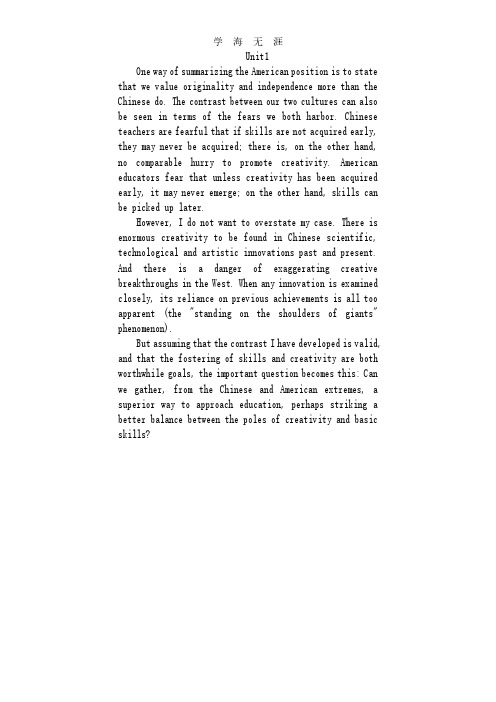
One way of summarizing the American position is to state that we value originality and independence more than the Chinese do. The contrast between our two cultures can also be seen in terms of the fears we both harbor. Chinese teachers are fearful that if skills are not acquired early, they may never be acquired; there is, on the other hand, no comparable hurry to promote creativity. American educators fear that unless creativity has been acquired early, it may never emerge; on the other hand, skills can be picked up later.However, I do not want to overstate my case. There is enormous creativity to be found in Chinese scientific, technological and artistic innovations past and present. And there is a danger of exaggerating creative breakthroughs in the West. When any innovation is examined closely, its reliance on previous achievements is all too apparent (the "standing on the shoulders of giants" phenomenon).But assuming that the contrast I have developed is valid, and that the fostering of skills and creativity are both worthwhile goals, the important question becomes this: Can we gather, from the Chinese and American extremes, a superior way to approach education, perhaps striking a better balance between the poles of creativity and basic skills?Walton set up a college scholarship fund for employees' children, a disaster relief fund to rebuild employee homes damaged by fires, floods, tornadoes, and the like. He believed in cultivating ideas and rewarding success."He'd say, 'That fellow worked hard, let's give him a little extra,'" recalls retired president Ferold F. Arend, who was stunned at such generosity after the stingy employer he left to join Wal-Mart. "I had to change my way of thinking when I came aboard.""The reason for our success," says Walton, in a company handout, "is our people and the way they're treated and the way they feel about their company. They believe things are different here, but they deserve the credit."Adds company lawyer Jim Hendren: "I've never seen anyone yet who worked for him or was around him for any length of time who wasn't better off. And I don't mean just financially, although a lot of people are. It's just something about him -- coming into contact with Sam Walton just makes you a better person."Making the journey from log cabin to White House is part of the American Dream. But when Jimmy Carter was defeated in his attempt to gain a second term as President of the United States he found himself suddenly thrown out of the White House and back in his log cabin. This is how he coped.SEAN: If that sort of thing happened only once in a while, it wouldn't be so bad. Overall, I wouldn't want to trade my dad for anyone else's. He loves us kids and Mom too. But I think that's sometimes the problem. He wants to do things for us, things he thinks are good. But he needs to give them more thought because:SEAN, HEIDI and DIANE: (In unison) Father knows better!(The lights quickly fade to black and then come up a second or two later. DIANE stands alone at the Down Right edge of the stage. HEIDI and SEAN enter Down Left and cross to the edge of the stage. )DIANE: Can you imagine how humiliated I was? An honor student, class president. And Father was out asking people to have their sons call and ask me to the prom! But that's dear old dad. Actually, he is a dear. He just doesn't stop to think. And it's not just one of us who've felt the heavy hand of interference. Oh, no, all three of us live in constant dread knowing that at any time disaster can strike because: Father knows better.I'd never realized how important daily routine is: dressing for work, sleeping normal hours. I'd never thought I relied so much on co-workers for company. I began to understand why long-term unemployment can be so damaging, why life without an externally supported daily plan can lead to higher rates of drug abuse, crime, suicide.To restore balance to my life, I force myself back into the real world. I call people, arrange to meet with the few remaining friends who haven't fled New York City. I try to at least get to the gym, so as to set apart the weekend from the rest of my week. I arrange interviews for stories, doctor's appointments -- anything to get me out of the house and connected with others.But sometimes being face to face is too much. I see a friend and her ringing laughter is intolerable -- the noise of conversation in the restaurant, unbearable. I make my excuses and flee. I re-enter my apartment and run to the computer as though it were a place of safety.I click on the modem, the once-annoying sound of the connection now as pleasant as my favorite tune. I enter my password. The real world disappears.Thought you were safe sharing secrets with Internet friends? Wait for the doorbell...The runway felt different this time. It startled him for a brief moment. Then it all hit him like a wet bale of hay. The bar was set at nine inches higher than his personal best. That's only one inch off the National record, he thought. The intensity of the moment filled his mind with anxiety. He began shaking the tension. It wasn't working. He became more tense. Why was this happening to him now, he thought. He began to get nervous. Afraid would be a more accurate description. What was he going to do? He had never experienced these feelings. Then out of nowhere, and from the deepest depths of his soul, he pictured his mother. Why now? What was his mother doing in his thoughts at a time like this? It was simple. His mother always used to tell him when you felt tense, anxious or even scared, take deep breaths.So he did. Along with shaking the tension from his legs, he gently laid his pole at his feet. He began to stretch out his arms and upper body. The light breeze that was once there was now gone. He carefully picked up his pole. He felt his heart pounding. He was sure the crowd did, too. The silence was deafening. When he heard the singing of some distant birds in flight, he knew it was his time to fly.Racing the clock every day is such an exhausting effort that when I actually have a few free moments, I tend to collapse. Mostly I sink into a chair and stare into space while I imagine how lovely life would be if only I possessed the organizational skills and the energy of my superheroines. In fact, I waste a good deal of my spare time just worrying about what other women are accomplishing in theirs. Sometimes I think that these modern fairy tales create as many problems for women as the old stories that had us biding our time for the day our prince would come.Yet superwomen tales continue to charm me. Despite my friend's warning against being taken in, despite everything I've learned, I find that I'm not only willing, but positively eager to buy that bridge she mentioned. Why? I suppose it has something to do with the appeal of an optimistic approach to life -- and the fact that extraordinary deeds have been accomplished by determined individuals who refused to believe that "you can't" was the final word on their dreams.Men have generally been assured that achieving their heart's desires would be a piece of cake. Women, of course, have always believed that we can't have our cake and eat it too-the old low-dream diet. Perhaps becoming a superwoman is an impossible dream for me, but life without that kind of fantasy is as unappealing as a diet with no treats.1) The young woman described to the policemen the way the man ran up to her and grabbed the bag from her hand. 2) All the people working for Sam Walton admire the way he manages Wal-Mart and the way he treats his employees. 3) The neighbors were disgusted at the way he talked to his old father.4) It's amazing the way the eight-year-old boy managed to stay so calm when he faced the emergency.1. You will find yourself penniless in a month.2. He found himself lying in a hospital ward.3. She found herself faced with the toughest job she had ever taken.4. Susan found herself in a trap from which she could not escape.1) Obviously what the speaker wanted to emphasize was the impact of these findings rather than the process that led to these findings.2) It seems that he is never bothered about what people would think about his behavior.3) The CEO never hesitates to let his employees know what he is planning for the company.4) The scientist will show the audience what a tele-operated robot can do for a family.5)Despite all this she manages to get her act together.1、She herself believed in freedom,so much so that she would rather die than live without it.2、Assuming the proposal is accepted,where are we going to get the money?3、Only by rewarding success can you bring out the best in your employess.4、It’s amazing the eight-year-old boy managed to stay so calm when he faced the emergency.5、Allen should have known better than to lend such a large sum of money to that untrustworthy cousin of his.。
全新版大学英语(第二版)综合教程2课文及翻译

Unit1Howard Gardner, a professor of education at Harvard University, reflects on a visit to China and gives his thoughts on different approaches to learning in China and the West.哈佛大学教育学教授霍华德·加德纳回忆其中国之行,阐述他对中西方不同的学习方式的看法。
Learning, Chinese-StyleHoward Gardner 1 For a month in the spring of 1987, my wife Ellen and I lived in the bustling eastern Chinese city of Nanjing with our 18-month-old son Benjamin while studying arts education in Chinese kindergartens and elementary schools. But one of the most telling lessons Ellen and I got in the difference between Chinese and American ideas of education came not in the classroom but in the lobby of the Jinling Hotel where we stayed in Nanjing.中国式的学习风格霍华德·加德纳1987年春,我和妻子埃伦带着我们18个月的儿子本杰明在繁忙的中国东部城市南京住了一个月,同时考察中国幼儿园和小学的艺术教育情况。
然而,我和埃伦获得的有关中美教育观念差异的最难忘的体验并非来自课堂,而是来自我们在南京期间寓居的金陵饭店的大堂。
全新版大学英语(第二版)2-Unit2-A-life-full-of-riches

Theme-related cloze (page 46):
Assignments
A debate: Do you think money can buy happiness?
A recommended English song: Money, money, money
3-12
In search of an answer the writer finds that not having expensive possessions doesn’t make him feel poor mainly because he enjoys life in many other ways. In conclusion, the writer thinks he’s grown to understand more about himself because of the boy’s question.
Language points in part one
Key to the Words or expressions :(Para. 1 to Para. 7)
• • • • • • 1. 面对 2. 捐款 3. 疑惑和好奇 4. 结结巴巴 5. 否认一些事实 6. 收入最低的档次
• • • • • • • 7. 得到物质的东西 8. 主要 9. 对计算机很少的需求 10. 珍惜 11. 逗乐 12. 一个重要方面 13. 对物质财富的追求
Pre-reading task (3)
Wealth outlook
1
contributes to
money
3
happiness
is equal to
- 1、下载文档前请自行甄别文档内容的完整性,平台不提供额外的编辑、内容补充、找答案等附加服务。
- 2、"仅部分预览"的文档,不可在线预览部分如存在完整性等问题,可反馈申请退款(可完整预览的文档不适用该条件!)。
- 3、如文档侵犯您的权益,请联系客服反馈,我们会尽快为您处理(人工客服工作时间:9:00-18:30)。
Unit 1How to StudyThere is a lot of misunderstanding about studying. Most students have not been taught the principles behind really effective working. Imagine a graph showing the amount a person learns against the number of hours he works in a day. If he doesn't do any work, he learns nothing (point 0). If he does an hour 's work he learns a certain amount (point 1). If he does two hours' work he learns about twice as much (point 2). If he does more work he'll learn still more (point 3). However, if he tries to do twenty-three and a half hours' work in one day, he'll be so tired that he'll hardly remember anything: what he learns will be very little (point 4). If he did less work he 'd learn more (point 5).Now whatever the exact shape of the graph 's curve, made by joining these points, it must have a high point. Point "X" is the very maximum anyone can learn in the day. And this represents the optimum, the best, amount of work to do. It is the best possible compromise between adequate time at the books and fatigue. Fatigue is an absolutely real thing; one can't escape it or ignore it. If you try to ignore it and press yourself to work past the optimum, you will only get on this downward slope and achieve less than the best—and then become very tired and lose your power of concentration.The skill in being a student consists of getting one 's daily study as near the optimum point as possible. I cannot tell you what the optimum is. It differs with the type of work, it differs from person to person, and even in the same person it varies from week to week. You must try to find your own. Every day you study, bear this principle of the optimum in mind. When you feel yourself getting fatigued, if you find yourself reading the same paragraph over and over again and not taking it in, that's a pretty good sign you 've reached your highest point for the day and should stop. Most ordinary students find their optimum at about five hours a day. Yours may be a little more or a little less—but if you get in five hours' good work a day, you will be doing well.Now, what are you doing with yourself when you aren't working? Before examinations some students do nothing at all except sit in a chair and worry. Here is another misunderstanding. People often think that the mind works like the body; it does not. If one wanted to save one 's physical energy in order to cut the maximum amount of firewood, one would lie flat on a bed and rest when one wasn't chopping. But the mind cannot rest. Even in sleep you dream, even if you forget your dreams. The mind is always turning. It gets its relaxation only by variety. That is what makes the mind rest.When you 've finished your optimum number of hours you must stop. You must not then sit around in the chair thinking about the work—that only tires without any learning. You must get out and do something. It doesn't matter what—anything so long as you are actively doing something else but work.有一个关于学习有许多误解。
大多数学生都没有真正有效的背后教工作的原则。
想象一下,一个图表显示的数额一人对他的小时数在一天工作学习。
如果他没有做任何工作,他学习什么(点0)。
如果他没有一小时的工作,他学到一定数额(第1点)。
如果他做了两小时的工作,他知道了两倍多(2点)。
如果他做更多的工作,他将学习更多的(3点)。
不过,如果他试图做23个半小时的工作,有一天,他会因为太累了,他会很难记住任何东西:他学习将是非常小(4点)。
如果他这样做较少的工作,他倒是学到更多(5点)。
现在,无论在图形的曲线精确形状,由这些点连接了,它必须有一个高点。
点“X”是任何人都可以学习很最高的一天。
这代表了最佳,最好的,要做大量的工作。
这是最好的可能的妥协之间有充分的时间在书籍和疲劳。
疲劳是绝对真实的东西,一个无法逃避它或忽略它。
如果你试图忽略它,然后按自己过去工作的最佳,也只获得这个走下坡路,实现比最好的,然后变得非常疲倦,失去你的集中力不足。
在当学生的技能获得一个'S作为由尽可能接近最佳点的日常学习。
我不能告诉你什么是最佳的。
它与不同类型的工作,它不同于他人的人,即使在同一人有异,从一周到一周。
你必须努力去发现你自己的。
每天你学习,牢记这个优化的原则。
当你觉得自己越来越疲惫,如果你发现自己阅读同一段一遍又一遍,不肯接受它,这是一个非常好的迹象你'维生素E达到了当天的最高点,应该停止。
最普通的学生发现在大约5个小时,每天的优化。
你可能会多一点还是少一点,但如果你在5个小时的工作,取得良好的一天,你会做得很好。
现在,什么是你自己做时,你不工作吗?一些学生考试前什么也不做,除了坐在椅子上和担心。
这里是另一个误解。
人们往往认为,思想就如同身体的工程,它不是。
如果有人想挽救一个人的身体能量,以减少对木柴的最高限额,一会平躺在床上休息时,一不砍。
但头脑不能休息。
即使在睡觉你的梦想,即使你忘了你的梦想。
心是永远转动。
它以品种,仅得到了缓和。
这就是使身心得到休息。
当你已经做完你的时间的最佳数目你必须停止。
你不能再坐在椅子上的思考的工作,没有任何学习的唯一轮胎。
你一定要出来做一点事。
这并不重要,任何事情只要你干点别的什么,但积极的工作。
Learning to Keep You Cool During TestsHave you ever felt so anxious during an examination that you couldn't even put down the answers you knew? If so, you were suffering from what is known as test anxiety.According to psychologist Ralph Trimble, test anxiety is a very real problem for many people. When you 're worried over your performance on an exam, your heart beats faster and your pulse speeds up. These reactions start others: You may sweat more than normal or suffer from a stomachache or headache. Your field of vision narrows and becomes tunnel-like. Before you know it, you 're having difficulty focusing."What I hear students say over and over again," says Dr. Trimble, who is working at the Psychological and Counseling Center at the University of Illinois, "is, 'My mind went blank.'"For a number of years, Dr. Trimble helped many students learn how to perform better during exams and to bring up their grades. Some of these students were interested in sharing what they learned and, with Trimble 's help, began holding workshops on overcoming test anxiety. For many students, just being in a workshop with other sufferers made them feel better. They realized that they were not the only ones who had done poorly on tests because of tension.The workshops were so successful that they are still given.In the workshops, students are taught that anxiety is normal. You just have to prevent it from getting the best of you. The first step is to learn to relax. If before or during an examination you start to panic, stretch as hard as you can, tensing the muscles in your arms and legs; then suddenly relax all of them.This will help relieve tension. But keep in mind that you don't want to be too relaxed. Being completely relaxed is no better than being too tense. "If you are so calm you don't care how you do on an examination, you won't do well," Trimble says. "There is an optimum level of concern when you perform at your best. Some stress helps. There are people who can't take even slight stress. They have to learn that in a challenging situation, being anxiously excited is good and will help them to do better. But if they call it anxiety and say, 'It's going to hit me again,' that will make them nervous and worried."As a student you must also realize that if you leave too much studying until a day or two before the examination, you can't do the impossible and learn it all. Instead, concentrate on what you can do and try to think what questions are likely to be asked and what you can do in the time left for studying.When you sit down to study, set a moderate pace and vary it by reading, writing notes, and going over any papers you have already written for the course, as well as the textbooks and notes you took in class. Review what you know. Take breaks and go to sleep early enough to get a good night 's rest before the exam. You should also eat a moderate breakfast or lunch, avoiding drinks like coffee and stay away from fellow students who get tense. Panic spreads easily.Get to the exam room a few minutes early so that you will have a chance to familiarize yourself with the surroundings and get out your supplies. When the examination is handed out, read the directions twice and underline the significant instructions, making sure you understand them. Ask the teacher to explain if you don't. First answer the easiest questions, then go back to the more difficult.On essay questions, instead of starting right away, take a few minutes to organize your thoughts, make a brief outline, and then start off with a summary sentence. Keep working steadily, and even when time starts to run out, don't speed up.你们可曾想过在一个考试,你甚至不能放下手中的答案你知道这样紧张?如果是这样,你的痛苦,什么是已知的考试焦虑。
